Proven Benefits of Breastfeeding for Both Mum and Baby
Recent studies have claimed a growing number of advantages of breastfeeding for both the child and the mother.
Breastfed offspring are smarter
A new Australian study has found children who were breastfed for six months or more performed much better in intelligence checks. Researchers from the Telethon Institute for Child Research studied more than 1,000 children.
Their research showed that boys who had been breastfed tallied much higher in reading, maths and spelling. The results were less apparent in girls.
The study's author, Associate Professor Wendy Oddy, states that the study displayed the long-term advantages of breastfeeding. There are crucial nutrients in breast milk that support mind development, especially for long chain fatty acids.
Breastfed offspring make better teens
Researchers are advising that mothers should breastfeed their offspring fo more than six months. They discovered a connection between breastfeeding and progeny mental health that extended to the child's teenage years.
The 14-year study released in the Journal of Paediatrics pursued nearly 3,000 women in Western Australia and followed the development of their offspring through to early adolescence. The women who took part in the study breastfed their offspring for various extents of time. Some women did not breastfeeding their offspring at all, others breast fed their babies for six months or more.
The behaviour attributes of the children where compared as teenagers. One of the study's authors, Professor Sven Silburn from the Menzies School of Health Research in Darwin, stated that the researchers found that for each additional month that a progeny was breastfed demeanour of the child in their teenage years improved.
Breastfeeding for six months or longer is positively linked with mental wellbeing and health in young children and adolescents.
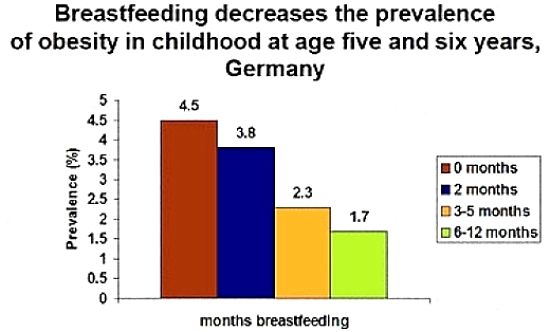
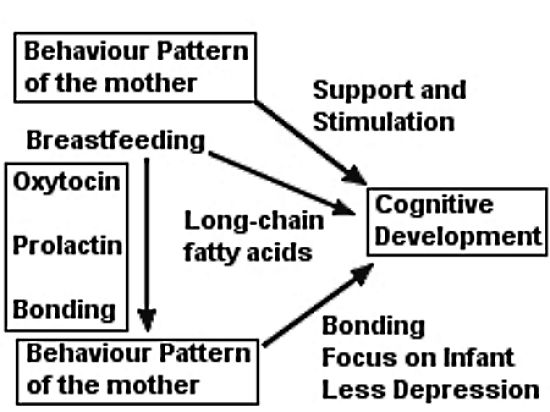
Breastfeeding Slashes Diabetes Risk in Mothers
An Australian study of more than 50,000 women displays that those with young children are more likely to develop Type 2 diabetes. However, the study released in the US journal 'Diabetes Care' showed that breastfeeding can counteract the risk to some extent.
The study was undertaken as part of the '45 and Up' study, which is Australia's biggest long-run study of ageing.
University of Western Sydney investigator Dr Bette Liu states that mothers who choose not to breastfeed their children were found to be 50 percent more likely to develop diabetes than those mothers who did not have children.
The study found that having young children appeared to boost the risk that a woman might develop diabetes later in life.
But the risk was reduced if their babies were breastfed for at least three months.
The breast feeding brought the risk back to that of women who had no children.
Known General Benefits of Breastfeeding
- defends your baby from sickness and infection
- supplies the correct nourishment for your growing and developing infant
- helps with the development of your baby's speech, eyesight and general intelligence
- encourages an exceptional bond between the mother and child
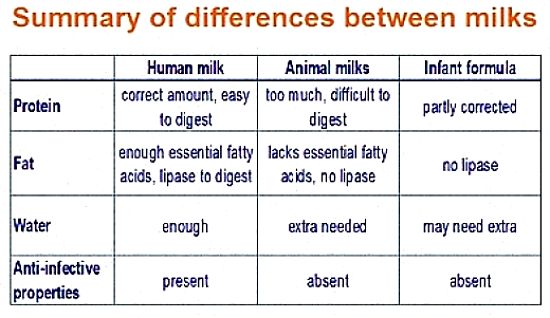
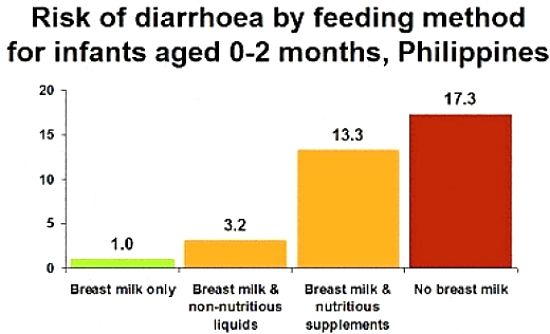
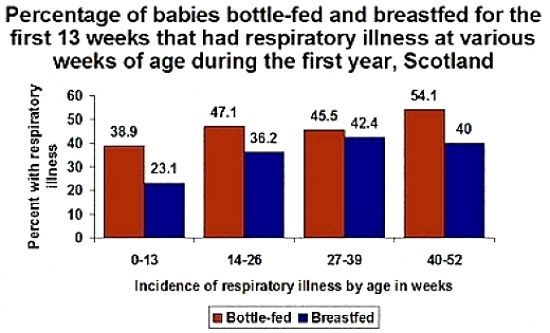
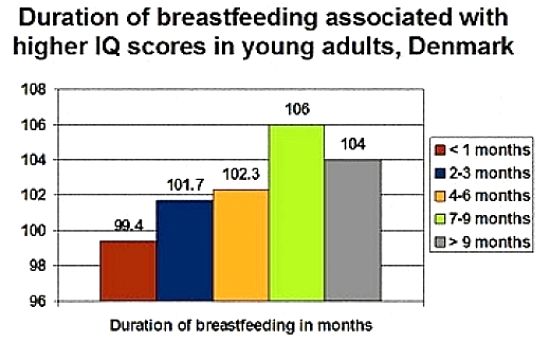
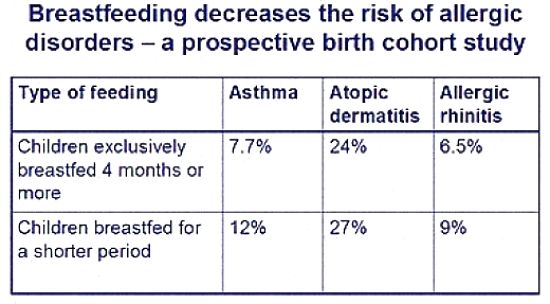
Babies Who are Not Breastfed
- have an increased risk of cot death
- have an expanded risks of developing allergies
-
are more costly to feed as you will be required to purchase costly infant formulas and various feeding equipment.
Benefits of Breastfeeding for the Baby (from preceding studies)
- Breast-fed young children are more resistant to infection and disease early in life than formula-fed children
- Breast-fed young children are less likely to suffer from various infections diseases such as: multiple sclerosis, juvenile diabetes, heart infections, and some cancers before the age of 15.
- Many investigations show that breastfeeding reinforces the immune system. During nursing, the mother passes antibodies to the baby, which help the baby fight against infections and improve the normal immune response and uptake of various vaccines.
- Respiratory sickness is far more widespread amongst formula-fed children. Formula fed babies displayed a threefold larger risk of being hospitalized with a critical respiratory infections than babies that were breast-fed for a period of at least of months.
- The incidence of Diarrheal infection is three to four times higher in formula-fed babies compared with those that were breastfed.
- Breastfeeding has been shown to decrease the prospect of ear diseases, and to avert recurrent ear infections. Ear diseases are a foremost reason why infants take antibiotics to treat infections.
- Researchers have found a decreased incidence of Sudden Infant Death Syndrome (SIDS) in breast-fed infants.
- Another clear-cut advantage from breastfeeding is that it may offer a defense from allergies. The incidence of Eczema, a known allergic disease, is considerably lower in breast-fed babies. An extensive review of more than130 investigations on allergy and breastfeeding demonstrated that breastfeeding stops young children from developing allergies. This effect is especially strong for young children whose parents have allergies.
- Children who are breast-fed generally have lower rates of dental cavities all through their lives.
- Several studies have suggested that breast-fed children are less likely to become obese later in childhood. Formula feeding has been shown to increase the risk of obesity by about a 20 to 30 percent.
- Children who are solely breast-fed for the first 3 months are 34 percent less likely to develop insulin-dependent diabetes as juveniles than formula-fed children.
- Some studies suggest that breast-fed young children show fewer psychological, learning and behavioral difficulties later in life. Cognitive development is expanded amidst young children whose mothers chose to breastfeed their babies. Breast-fed young children tend to be assertive, more mature, and more self-confident with themselves as they developed.
Benefits to the Mother Who Beast Feeds Their Babies
Various research investigations have shown that breastfeeding improves the wellbeing of the mothers as well as their babies.
- Breastfeeding assists a woman to more quickly lose excess weight after birth. Mothers burn calories during lactation as their bodies make milk to feed the baby. Some of the fat accumulated throughout pregnancy provides an energy source for lactation.
- Breastfeeding releases a hormone (oxytocin) that helps the uterus to come back to its usual dimensions more quickly.
- Mothers who breastfeed are less likely to develop osteoporosis later in life, lose weight more quickly after birth and have a lesser risk of uterine, breast and ovarian cancer.
- A woman who gives birth and proceeds to nurse her baby, has a natural form of birth control that is about 98 percent effective.
- Diabetic women advance their wellbeing by breastfeeding.
- Research has shown that women who breast-feed for a total of two or more years decrease their chance of developing breast cancer by 24 percent.
- The emotional well being of the mother may be increased by the connection she evolves with her infant throughout breastfeeding, producing fewer feelings of anxiety and developing a strong emotional attachment with her baby. Holding the progeny to her breast presents most mothers with a powerful psychological bonding experience.